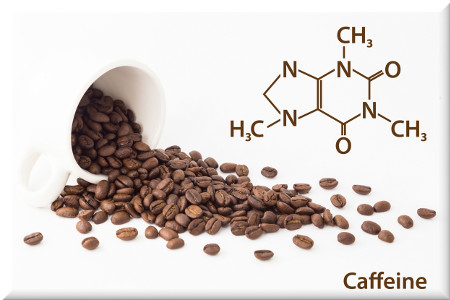 Caffeine is a mild central nervous system stimulant found in coffee beans, tea leaves, and cocoa beans. The question during early recovery is, can you handle a doubling of your normal daily caffeine intake without experiencing "caffeine jitters" or other symptoms of over-stimulation?
Caffeine is a mild central nervous system stimulant found in coffee beans, tea leaves, and cocoa beans. The question during early recovery is, can you handle a doubling of your normal daily caffeine intake without experiencing "caffeine jitters" or other symptoms of over-stimulation?
Nicotine somehow doubles the rate by which the body depletes caffeine. What's that mean? It means that if we were drinking two cups of coffee while using nicotine, once nicotine use ends, the stimulant effect of those two cups might now feel like four.
According to a 1997 study, "continuous caffeine consumption with smoking cessation has been associated with more than doubled caffeine plasma levels. Such concentrations may be sufficient to produce caffeine toxicity symptoms in smoking abstinence conditions."[1]
The study found "a significant linear increase in caffeine sputum levels across 3 weeks post cessation," and that "three weeks after cessation, concentrations reached 203% of baseline for the caffeine user."
An earlier study found that the clearance rate of caffeine from blood plasma averaged 114 milliliters per minute in nicotine smokers and 64 milliliters per minute in non-smokers.[2]
Symptoms of caffeine intoxication have been seen with as little as 100 milligrams of caffeine daily. They may include restlessness, nervousness (anxiety), excitement, insomnia, a flushed face, increased urination and gastrointestinal complaints.
Intoxication symptoms seen when more than 1 gram of caffeine is consumed per day include muscle twitching, rambling flow to thoughts and speech, irregular or rapid heartbeat, irritability and psycho-motor agitation.[3]
Most of us can handle a doubling of our daily caffeine intake without getting the jitters. But how can we tell whether the anxieties we feel are related to nicotine cessation or to too much caffeine? It isn't easy.
Experiment with an up to 50% reduction in daily caffeine intake if at all concerned. Be careful not to reduce normal caffeine intake by more than 50% unless you want to add the symptoms of caffeine withdrawal to those of nicotine withdrawal.
Caffeine withdrawal symptoms can include headache, fatigue, decreased energy, decreased alertness, drowsiness, decreased contentedness, depressed mood, difficulty concentrating, irritability, and a foggy mind. Symptoms typically begin 12 to 24 hours after caffeine use ends, reach peak intensity at 20 to 51 hours, and normally last 2 to 9 days.[4]
The following is a sampling of the number of milligrams (mg) of caffeine "typical" in various substances:[5]
85mg coffee - 8 ounces drip brewed
80mg "energy drinks"
75mg coffee - 8 ounces percolated
40mg espresso - 1 ounce servings
40mg tea - 8 ounces brewed
28mg tea - 8 ounces instant
26mg baker's chocolate - 1 ounce
25mg iced tea - 8 ounces
24mg some soft drinks - 8 ounces
20mg dark chocolate - semi sweet - 1 ounce
06mg cola beverage - 8 ounces
05mg chocolate mild beverage
04mg chocolate flavored syrup
03mg coffee - decaffeinated
The stimulant effects of a 24mg soft drink before bed or a 20mg chocolate bar could now feel like two sodas or two chocolate bars. Consider a modest reduction of up to one-half if experiencing difficulty falling to sleep.
Look at it this way, if we were a big caffeine user, it's cheaper now. We get twice the stimulation for half the price.
References:
2. Joeres R, Influence of smoking on caffeine elimination in healthy volunteers and in patients with alcoholic liver cirrhosis, Hepatology, May-June 1988, Volume 8(3), Pages 575-579.
3. American Psychiatric Association, Caffeine Intoxication, Diagnostic and Statistical Manual of Mental Disorders, Fourth Edition, Text Version, Page 232.
4. Juliano LM, et al, A critical review of caffeine withdrawal: empirical validation of symptoms and signs, incidence, severity, and associated features, Psychopharmacology, October 2004, Volume 176(1), Pages 1-29.
5. National Institute of Health, Caffeine, National Toxicology Program, webpage updated 04/23/08, http://cerhr.niehs.nih.gov/common/caffeine.html
All rights reserved
Published in the USA
